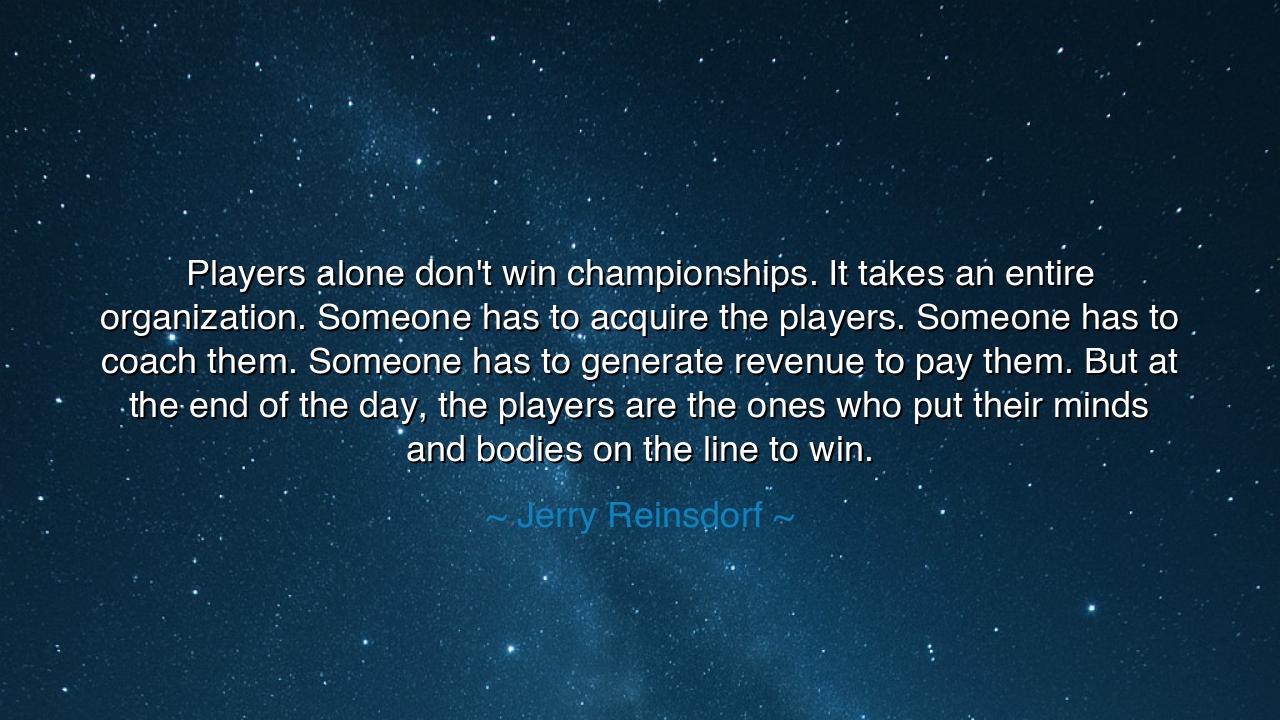
Players alone don't win championships. It takes an entire
Players alone don't win championships. It takes an entire organization. Someone has to acquire the players. Someone has to coach them. Someone has to generate revenue to pay them. But at the end of the day, the players are the ones who put their minds and bodies on the line to win.






When Jerry Reinsdorf, the storied owner of the Chicago Bulls and Chicago White Sox, declared, “Players alone don’t win championships. It takes an entire organization. Someone has to acquire the players. Someone has to coach them. Someone has to generate revenue to pay them. But at the end of the day, the players are the ones who put their minds and bodies on the line to win,” he spoke a truth that transcends the boundaries of sport. His words are not merely about basketball or baseball — they are a reflection on the interdependence of human effort, on the sacred harmony that exists between the many parts of any great endeavor. In them lies an ancient lesson: that no victory is ever born of a single hand, and no hero stands alone upon the summit.
Reinsdorf, who guided the Chicago Bulls through the age of Michael Jordan, knew both the glory of triumph and the tension that lies behind it. He watched the world’s greatest player soar to championships, but he also knew that behind every dunk and every trophy was an unseen army — scouts who searched the earth for talent, trainers who mended broken bodies, coaches who carved raw energy into strategy, and workers who kept the lights burning in the arenas. His insight reminds us that greatness is not the gift of one, but the harmony of many. It is the orchestra, not the soloist, that brings forth the music of victory.
This truth echoes back to the dawn of civilization. In the ancient phalanx of Sparta, no warrior fought alone. Each shield overlapped with another, forming an unbreakable wall of unity. The strength of the formation did not lie in the might of any one soldier, but in the discipline and trust of all. A single failure of cooperation could bring ruin to all, but when they moved as one — when each man fought not for himself but for the brother beside him — they became invincible. So too, Reinsdorf’s words teach that triumph in any field, whether in war, art, or sport, demands this same spirit of collective excellence.
Yet Reinsdorf also honors the warrior at the heart of the struggle — the player, the one who risks pain, fatigue, and failure in the crucible of battle. “At the end of the day,” he says, “the players are the ones who put their minds and bodies on the line to win.” This is not flattery but reverence. For while the strategist may plan and the leader may inspire, it is the fighter who bleeds. It is the player who must turn preparation into courage, potential into victory. There is no triumph without sacrifice, and no organization — however wise or powerful — can succeed without those willing to bear the cost of the dream.
Consider the story of the Chicago Bulls dynasty of the 1990s — a living testament to Reinsdorf’s philosophy. Michael Jordan’s brilliance lit the sky like a comet, but that brilliance alone could not have forged six championships. It required the guidance of Phil Jackson, the wisdom of Jerry Krause in assembling the roster, and the relentless work of teammates like Scottie Pippen and Dennis Rodman. Behind them were coaches, doctors, executives, and countless others whose names never appeared in headlines. Together, they built not just a team, but a machine of unity, where every piece, great or small, served a purpose in pursuit of excellence.
This harmony of effort is not unique to sport — it is the blueprint of all human success. A cathedral cannot rise by the hand of the architect alone; it requires the mason, the carpenter, the painter, and the faithful who bring their prayers within its walls. Likewise, a nation, a business, or a family thrives only when each member honors their role and works in concert with others. The organization, as Reinsdorf reminds us, is not a mere structure — it is a living body, and each part must serve the whole.
Therefore, let this truth be carved into the minds of all who seek greatness: no victory belongs to one alone. The strongest leader is nothing without the loyalty of his people; the most gifted worker fails without the foundation others have built. Reinsdorf’s wisdom calls us to humility — to remember that even the brightest star shines only because of the sky that holds it. But it also calls us to courage — to give our full strength, our full devotion, to whatever role we play within the greater whole.
So, my children, whether you lead or follow, build or fight, teach or learn, remember this: championships of the spirit — in life, in work, in love — are won by unity, by respect, and by shared purpose. Honor those who labor unseen. Support those who carry the heaviest burden. And when your time comes to step onto the field, give all that you are — body and mind, heart and soul — for the cause that unites you. For when each part serves the whole with faith and strength, victory is not only possible — it is inevitable, and it is eternal.






AAdministratorAdministrator
Welcome, honored guests. Please leave a comment, we will respond soon